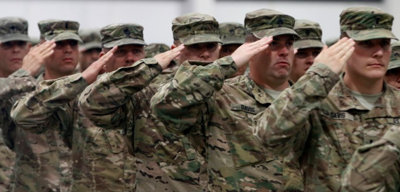COLUMBIA — The nearly 40,000 active duty military members stationed in South Carolina continue to work without pay amid the ongoing shutdown of the national government.
There are also about 11,200 civilian employees working for the U.S. Department of Defense in the Palmetto State. Those whose roles the various military branches have deemed non-essential are furloughed until Congress comes to an agreement over continuing to fund the federal government.
“This is a military state, with eight major installations,” Gov. Henry McMaster told reporters Thursday.
But due to shutdown-induced travel restrictions, the commanders of just four of those installations were able to attend an annual meeting in Columbia held to brief the governor about any issues each base may be experiencing.
Bases represented were Fort Jackson, a U.S. Army training base in Columbia; Shaw Air Force Base in Sumter; Joint Base Charleston, which includes units from the Air Force, Navy and Coast Guard; and U.S. Coast Guard Base Charleston.
Commanders didn’t travel from Parris Island, a U.S. Marine Corps training base; Marine Corps Air Station Beaufort; Naval Hospital Beaufort; and McEntire Joint National Guard Base in rural Richland County.
“They’re not traveling, but they’re still on duty,” McMaster was quick to say.
“Most importantly, young soldiers, sailors, airmen, Marines and guardians are working today, not receiving a paycheck,” added state Veterans’ Affairs Secretary Todd McCaffrey. “They continue to stand on the watch, and that’s important to recognize.”
The Congressional Budget Office estimates about 750,000 federal employees are furloughed nationwide since the shutdown began Wednesday.
Both those who continue to work and those who are furloughed will receive back pay when the shutdown ends.
McCaffrey, a retired Army major general, said he went through several shutdowns while in uniform and each one is unique.
When a base’s civilian workforce is not coming to work, there are things those employees do — to include cutting the grass and maintaining facilities — that fall by the wayside.
Despite all this, the shutdown was not a topic of conversation during the briefing.
Instead, military leaders told the governor about struggles their members face finding affordable off-base housing and childcare.
The commanders of Joint Base Charleston talked about the ongoing need for road improvements leading into the base and issues they’ve been having with civilian drones entering the base’s airspace.
The Coast Guard asked state political leaders to advocate for long-term funding to maintain weather buoys off the coast that help predict and track hurricanes.
McMaster laid the blame for the shutdown on U.S. Senate Democrats. The U.S. House narrowly passed a seven-week stopgap spending bill that failed in the Senate.
Democrats have refused to vote with Republicans to extend government funding unless the GOP majority agrees to permanently fund enhanced subsidies that help people pay their private health insurance premiums. The expansion, initially approved as part of the 2021 American Rescue Plan Act, was extended as part of a 2022 congressional spending package. But it’s set to expire again at the end of this year. Democrats also want a repeal of health spending cuts approved as part of the massive tax policy package signed into law July 4.
Republicans call those demands a $1.5 trillion wish list and ransom note. That figure is an estimate of what the Democrats’ proposal would add to the federal deficit over a decade, according to the Committee for a Responsible Federal Budget, a Washington think tank, which argues any plan that requires new borrowing should be offset by cuts.
Although Republicans have majorities in the House and Senate, the stopgap funding measure is subject to a 60-vote threshold in the upper chamber. With 53 Republicans, Democratic support is necessary.
When it comes to other federally funded benefits, such as food benefits for poor families, women and children, McMaster said there is still money in the system to keep paying those out for now.
“But the longer the shutdown continues, at the insistence of the Democratic leadership, then the more danger there is that those funds will not be available,” McMaster said. “That’s why they got to get back to work, do their job. Just go on in and vote.”
The last federal shutdown, which began in December 2018 during the first Trump presidency, was led by Senate Republicans. The stalemate began after President Donald Trump threatened to veto any funding bill that did not include money for construction of a wall at the nation’s southern border with Mexico.
That shutdown, the longest in history, lasted 35 days.
However, it didn’t affect the departments of Defense, Education, Energy, Health and Human Services, Labor and Veterans Affairs, since Congress had approved those agencies’ full-year funding bills. Lawmakers had also enacted the Legislative Branch appropriations bill, exempting Capitol Hill from any repercussions.
That isn’t the case this time around since none of the dozen government spending bills have become law.
SC Daily Gazette is part of States Newsroom, a nonprofit news network supported by grants and a coalition of donors as a 501c(3) public charity. SC Daily Gazette maintains editorial independence. Contact Editor Seanna Adcox for questions: info@scdailygazette.com.











